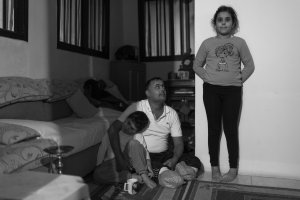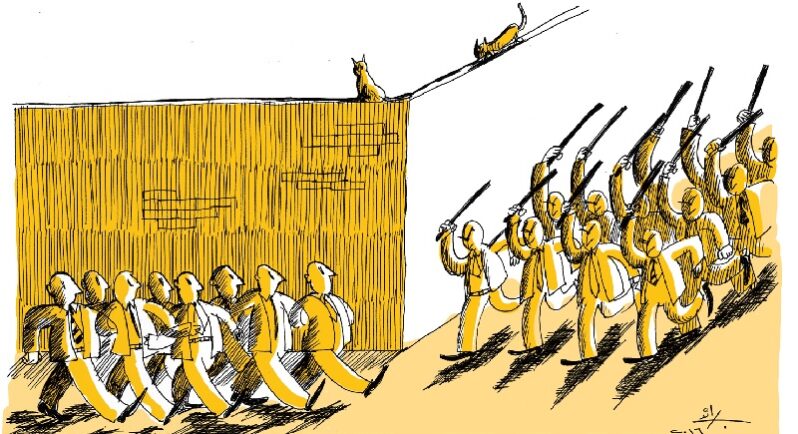The Status of Children of Jordanian Mothers: The Discourse of Demography

Article 3 of the Jordanian Nationality Law No. (6) of 1954 defines a Jordanian national as follows:
Any person whose father holds the Jordanian nationality;
Any person born in the Hashemite Kingdom of Jordan to a Jordanian mother and to a father of unknown nationality, stateless, or whose filiation is not established; and
Any person born in the Hashemite Kingdom of Jordan to unknown parents, as a foundling in the Kingdom shall be considered born therein, pending evidence to the contrary.
There is clear gender discrimination in the previous text. The only case in which a Jordanian woman can pass on her nationality to her children is if the father is of unknown nationality, stateless, or of unknown parentage. This was confirmed by the Supreme Court of Justice in one of its provisions: “Denying Jordanian nationality to children of Jordanian mothers and non-Jordanian fathers is in accordance with the provisions of the law, thus the case shall be dismissed.”[1] The court also asserted that “the Jordanian mother may not confer nationality upon her children who are born in Jordan to a Palestinian father; the brutal occupation shall not affect his nationality, and he shall not be deemed stateless or of unknown nationality”.[2]
Before presenting the government’s justifications and the steps taken in this regard, it should be noted that according to the Civil Status Department, there are approximately 89,000 Jordanian women married to stateless persons and to men holding 140 nationalities; and, the number of their children is 356,000.
The Government’s Justifications: Rejecting the Resettlement of Palestinians
Based on the aforementioned, it was no surprise that Jordan got criticized by international committees when the latter reviewed the submitted periodic reports. The concluding observations of the Human Rights Committee upon its review of the fourth periodic report submitted in 2009 are a case in point.[3] The same criticism was repeated in the special rapporteur’s report on violence against women and its causes and consequences following her visit to Jordan in November 2011,[4] as well as in the report of the Committee on the Rights of the Child which expressed a deep concern over the discrimination faced by the children of Jordanian women who are married to non-Jordanians. Such discrimination is in contravention of the Constitution and of Jordan’s international [treaty] obligations.[5]
The Jordanian government justifies this discrimination, stating that “it was agreed amongst the Arab League states to ban giving citizenship of any Arab state to Palestinians in order to preserve the Palestinian identity, and to not adversely affect the efforts exerted for the right of return”.[6] On the other hand, the Jordanian government did not indicate why this type of discrimination is applied to all women if it is supposed to pertain to the status of Jordanian women who are married to Palestinians. There are clear constitutional suspicions in the Nationality Law and the Law of Residency and Foreigners Affairs, yet no attempts to challenge the constitutionality of these laws before the Constitutional Court have been recorded.
In 2002, following international criticism and pressure by a number of human rights organizations, the Jordanian government pledged before the international committees to eliminate the main difficulties faced by this category with respect to the enjoyment of their rights, and to streamline the way for them to enjoy some of the essential economic and social rights such as education, health care, and residence.[7]
The fact of the matter is, the government's strict stand on the amendment of the Nationality Law is due to concerns about disrupting the demographics of the Jordanian population in Jordan. Most Jordanian women married to non-Jordanians are married to holders of Palestinian citizenship. Thus, granting their children Jordanian nationality would increase the number of citizens of Palestinian origin. Many have expressed these concerns publicly, saying that “passing on citizenship in this manner leaves the door wide open to tampering with the identity of the Jordanian State, and harms its demographic balance which is an essential element of security and national stability”.[8] This issue was pointed out explicitly in one of WikiLeaks documents which stated that “Jordanian lawmakers reject any change to the law, i.e., the Nationality Law, deeming it politically impossible, despite the willingness of civil society institutions to negotiate a compromise. In the end, it seems clear that Jordanian identity policies, rather than gender equality interests, are the focus of the debate”.[9]
Privileges as a Substitute of Nationality?
At the end of 2014 and as a result of a longtime advocacy movement, the Cabinet issued instructions to grant children of Jordanian women and non-Jordanian fathers a number of privileges, with a set of conditions. The conditions are as follows:
Privileges shall be provided to the children, both males and females, of a Jordanian mother married to a non-Jordanian man;
The mother should have been a resident in Jordan for at least five years;
The son should have a legal residence; and
The son should not be married.
The children are entitled to identity cards if they meet these conditions. Their privileges are as follows:
Work. These children shall be allowed to work in professions that are restricted to Jordanian nationals, provided that no Jordanian substitute is available for this work. They [children] shall be exempt from work permit fees;
Investment. They shall be allowed to make investments and acquisitions in the Kingdom, in accordance with the provisions of the laws, regulations, and instructions;
Education. Those residing in Jordan shall be enrolled in government schools for elementary and secondary education, just like Jordanian students;
Health. Minors residing in the Kingdom shall be covered by the health insurance of their mother at government hospitals and health centers, in accordance with the Civil Health Insurance Regulation and the instructions issued thereunder; and
Driving. They shall be allowed to obtain a private driver’s license, provided they obtain a residence permit.
Up until 2015, more than 45,000 identity cards were issued for the children of Jordanian women married to foreigners to enable them to obtain these concessions. Yet, it seems that these cards have remained devoid of any benefit. Many of these children have expressed their shock over the fact that when they visited the competent departments to benefit from the privileges granted to them, they faced rejection by the staff under the pretext that they [staff] “have not received any information or instructions on how to deal with them”.
In August 2015, after raising the issue in many press outlets and by some MPs and civil society organizations, Interior Minister Salameh Hammad announced that an office for grievances and complaints at the ministry has been opened to receive any comments about the instructions issued by the Cabinet on these privileges. The complaints shall be followed up on immediately with the respective authorities to ensure the implementation thereof. However, to date, no measures have been taken to apply these instructions on the ground.
This article is an edited translation from Arabic.
__________
[1] Decision No. 225/1987 on March 30, 1998 (common jury), Issue No. 1, p. 168, the Bar Association Journal for the year 2000.
[2] Decision No. 41/1983 on January 1, 1983 (common jury), Issue No. 7, p. 940, the Bar Association Journal for the year 1983.
[3] Human Rights Committee, Consideration of reports submitted by States parties under Article 40 of the Covenant, Concluding observations of the Human Rights Committee, Jordan, CCPR/C/JOR/CO/4, November 18, 2010, para 7.
[4] Report of the Special Rapporteur on violence against women, its causes and consequences, Rashida Manjoo, Mission to Jordan, A/HCR/20/16/Ad d1, May 14, 2012, para 88/b.
[5] Consideration of Reports Submitted by States Parties, Concluding Observations: Jordan, CRC/ C/JOR/CO/3, September 29, 2006, para 29.
[6] This justification was included in the fifth periodic report submitted to the Committee on the Elimination of Discrimination against Women in 2010, and in the third periodic report submitted to the Human Rights Committee in 2009, and during the visit of the special rapporteur on violence against women, its causes and consequences on Jordan in November 2011.
[7] CEDAW/C/JOR/Q/5/ Add.1, February 13 – March 2, 2012, para 4.
[8] See: “Gishan Claiming National Interest: Naturalization of Children of Jordanian Women is a Demographic Problem”, al-Sawt News website, July 25, 2011.
[9] For more on this topic, see 7iber website, WikiLeaks in Arabic: “Jordanian Identity Policies Surmount Gender Equality Attempts”, January 4, 2011.



